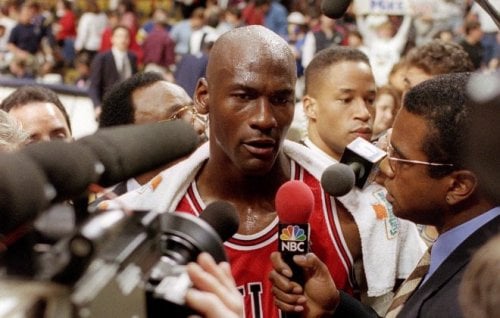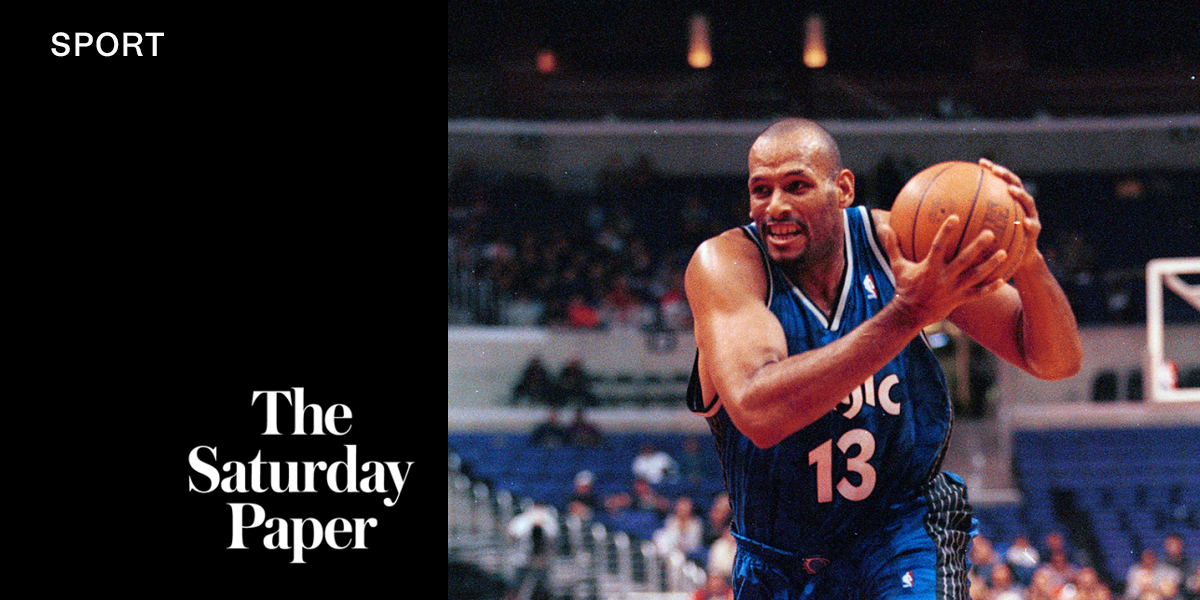He’s had a remarkable career, though there’s every chance you’ve never heard of John Amaechi. As a professional basketballer Amaechi made history: he was the first Englishman to play in the NBA, the first undrafted player to make an NBA team’s starting five and, in 2007, the first current or former NBA player to come out as gay. Last month, Amaechi, now a philosopher, psychologist and author, released his third book, It’s Not Magic: The Ordinary Skills of Exceptional Leaders.
There was no championship ring, no All-Star appearances. His box scores were modest. After his first season in the NBA, with the Cleveland Cavaliers, he was cut and spent two years in several European leagues before he had smoothed the flaws of his game sufficiently to re-spark the NBA’s interest.
None of this should have happened. If many superstars dazzle with athletic precocity, Amaechi was the opposite: an uncoordinated and painfully introverted kid who was all but contemptuous of sport until his late teens.
Born in Boston in 1970 to an English mother and Nigerian father, Amaechi was raised in Greater Manchester by his mother alone. Years later, when his abusive father died, Amaechi declined to speak at his funeral.
By the age of 16, Amaechi was already 203 centimetres tall, a fact that made the self-conscious boy terribly conspicuous. By his own account, he was overweight, ungainly and possessed few friends – “a powerless outcast”, as he described himself in his 2007 memoir.
His favourite place was a library, where he binged on sci-fi, fantasy and the adventures of the Hardy Boys. If he couldn’t abandon his body, books at least offered an escape. In Victor Hugo’s The Hunchback of Notre-Dame, Amaechi saw something of himself in Quasimodo – a character who, despite his tender heart, is thought dangerous and vulgar. On a rugby field, Amaechi can still recall a father calling him a “mutant freak”. His mother, ever supportive, confronted the man.
Amaechi didn’t begin playing basketball until he was 17, and the conventional wisdom was that no professional career was possible for one who had started so late. Never mind: Amaechi was disciplined and enjoyed the observable progress of his skills and the improvement of his confidence. He lost weight and, soon enough, was dominating for Manchester United’s basketball team.
A terrible accident at school camp should have finally quelled any ambitions for professional basketball, much less a historic admission to the NBA. A falling windowpane, dislodged from its frame, almost severed his right hand – the tendons and muscle would require multiple surgeries and months of rehabilitation. But the accident at least served two things: first, in mourning his presumed athletic career, Amaechi was surprised to realise how much basketball now meant to him. Second, he was sufficiently dedicated that he trained for months exclusively using his non-preferred hand. This had the effect of making him that rare commodity: an ambidextrous baller.
Throughout his athletic career, Amaechi kept his sexuality to himself. As such, he heard no end of homophobic jokes, derision and unvarnished hate in various locker rooms.
From a hospital bed in Manchester, though, it was a long and circuitous path to the NBA. He applied to thousands of high schools in the United States, only one of which – in Toledo, Ohio – accepted him. From there he played college basketball for Vanderbilt University and Penn State, before registering for the NBA draft in 1995. Amaechi was already 24, an exceptionally advanced age to enter the draft lottery, and no team thought him worth the risk. This obliged his entry via the convoluted and highly competitive summer camp system, where free agents compete for the final roster spaces on teams that have any spare. Cleveland took a gamble.
Amaechi has a lovely line about what’s required to become successful: “being eager in the face of the mundane and the vexing.” He says that behind every game-winning shot and public delirium, there are untold private hours dedicated to the most unglamorous and monotonous practice. Tiny elements of the game – a basic routine of catch, pivot, pass, for example – might be rehearsed for an hour straight so that fundamentals become ingrained.
Never the most gifted basketballer, Amaechi was always one of the most obedient and disciplined. Loyal, too. That loyalty – of rewarding those who had rewarded him – would express itself in the most extraordinary, and personally regrettable way, in 2000.
Amaechi’s return to the NBA in 1999 was with the Orlando Magic. Averaging more than 10 points and three rebounds a game, it was the best of his five seasons in the world’s best league. Complementing Amaechi’s pleasure was the team camaraderie, helmed by coach Doc Rivers, and their upsetting of low expectations. The Magic then had lost superstar Shaquille O’Neal and Penny Hardaway and were rebuilding. The squad was made of modest players with low profiles but high commitment – and a willingness to accept their particular roles, however self-effacing. They played for each other, this team of “Heart and Hustle”, and exceeded expectations. “A stunning reminder that a loveable band of low-rent overachievers still can thrive in an age of dot.com, overvalued superstars,” the Orlando Sentinel wrote.
So when the Los Angeles Lakers came knocking, Amaechi was torn. The Lakers had O’Neal and Kobe Bryant and, in Phil Jackson, one of the game’s great coaches. They were about to win a string of championships and were offering Amaechi $17 million over six years. Orlando could only offer one year on $600,000 with no guarantee of extension.
Still, Amaechi felt he owed the team something and he declined the Lakers’ offer. He was cut at the end of the next season – a betrayal of the informal but earnest assurances that he would stay, that he was “family”.
But basketball wasn’t everything. He knew that. Amaechi was studying for his doctorate in psychology in these years and he brought his textbooks with him for the flights to away games. His dream of becoming a psychologist began as a boy and well preceded the dream of professional basketball.
Throughout his athletic career, Amaechi kept his sexuality to himself. As such, he heard no end of homophobic jokes, derision and unvarnished hate in various locker rooms. “The church … seemed enlightened compared to some of my [Utah] teammates,” he wrote in 2007. “Homosexuality is an obsession amongst ballplayers, trailing only wealth and women. They just didn’t like ‘fags’ – or so they insisted over and over and over again. It soon became clear they didn’t understand fags enough to truly loathe them. Most were convinced, even as they sat next to me on the bus or plane or threw me the ball in the post, that they had never met one.”
It was through this memoir, The Man in the Middle, that Amaechi came out. Death threats followed, and players publicly expressed their fear or disgust. Tim Hardaway, the All-Star guard and future Hall of Famer, then a few years into his athletic retirement, was notoriously cruel. “You know, I hate gay people, so I let it be known,” he said. “I don’t like gay people and I don’t like to be around gay people. I am homophobic. I don’t like it. It shouldn’t be in the world or in the United States.”
In comments he must have come to regret, a young LeBron James – he was 23 at the time – said, “With teammates you have to be trustworthy, and if you’re gay and you’re not admitting that you are, then you are not trustworthy. That’s like the No. 1 thing as teammates – we all trust each other. You’ve heard of the in-room, locker room code. What happens in the locker room stays in there. It’s a trust factor, honestly. A big trust factor.”
Almost 20 years have passed. Today, Amaechi remains ambivalent about his athletic career. “I put a ball in a hole,” is a favourite saying of his. But as well as being a professor at the business school of the University of Exeter in south-western England, Amaechi is an NBA ambassador. He still enjoys the game, and it left him with a distinctive status that made his coming out powerful.
“I’m not doing this to change the NBA,” he said at the time of his memoir’s release. “I’m doing this for the high school quarterback who is thinking about sticking his head in a noose because he can’t come to grips with the fact he’s gay.”
This article was first published in the print edition of The Saturday Paper on
October 18, 2025 as “Breaking barriers”.
For almost a decade, The Saturday Paper has published Australia’s leading writers and thinkers.
We have pursued stories that are ignored elsewhere, covering them with sensitivity and depth.
We have done this on refugee policy, on government integrity, on robo-debt, on aged care,
on climate change, on the pandemic.
All our journalism is fiercely independent. It relies on the support of readers.
By subscribing to The Saturday Paper, you are ensuring that we can continue to produce essential,
issue-defining coverage, to dig out stories that take time, to doggedly hold to account
politicians and the political class.
There are very few titles that have the freedom and the space to produce journalism like this.
In a country with a concentration of media ownership unlike anything else in the world,
it is vitally important. Your subscription helps make it possible.
Send this article to a friend for free.
Share this subscriber exclusive article with a friend or family member using share credits.
Used 1 of … credits
use share credits to share this article with friend or family.
You’ve shared all of your credits for this month. They will refresh on November 1. If you would like to share more, you can buy a gift subscription for a friend.
SHARE WITH A FRIEND
? CREDITS REMAIN
SHARE WITH A SUBSCRIBER
UNLIMITED
Loading…

Sport
The day the fates of Jordan and Maradona diverged
Martin McKenzie-Murray
On this day, three decades ago, the careers of two sporting legends took sharply divergent paths.


